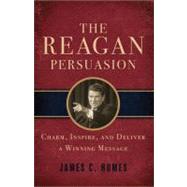
What is included with this book?
| Acknowledgments | p. vii |
| The Fifteen Secrets of the Great Communicator | p. 1 |
| Preparation Is Paramount | p. 7 |
| The Take-Away Parable | p. 17 |
| Clarion Closers | p. 33 |
| The Take-Away Zinger | p. 49 |
| The Reagan Recipe for Humor | p. 61 |
| Podium Presence | p. 77 |
| Voice Is Verse | p. 87 |
| Read a Speech Like Reagan | p. 95 |
| Eat, Drink, and Be Sorry | p. 105 |
| No PowerPoints, Graphs, or Slides | p. 111 |
| "Case the Joint" | p. 121 |
| "Lies, Damned Lies, and Statistics" | p. 133 |
| Acing the Q&A | p. 141 |
| Brevity Is Beauty | p. 157 |
| "Sellin' Is Believin'" | p. 165 |
| Ten Tips to Speak Like Reagan | p. 177 |
| Table of Contents provided by Ingram. All Rights Reserved. |
The New copy of this book will include any supplemental materials advertised. Please check the title of the book to determine if it should include any access cards, study guides, lab manuals, CDs, etc.
The Used, Rental and eBook copies of this book are not guaranteed to include any supplemental materials. Typically, only the book itself is included. This is true even if the title states it includes any access cards, study guides, lab manuals, CDs, etc.